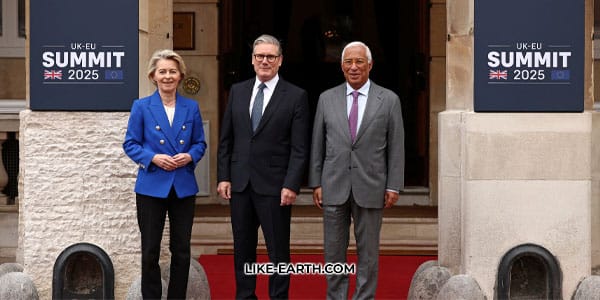Brexit Reset Deal: A TBC Agreement with the EU Still Unresolved

Brexit reset deal remains a TBC agreement, leaving many key issues still unresolved between the United Kingdom and the European Union as of May 20, 2025.
Nearly five years after the official Brexit implementation, a newly proposed reset deal between the UK and EU is raising more questions than answers. UK officials have acknowledged that the framework of the “reset agreement” is largely a work in progress. Many see it as an attempt to revive dialogue with Brussels and stabilize cross-border ties strained by years of disruption.
The Origins of the Brexit Reset Deal
The idea of a Brexit reset emerged earlier this year after increasing political pressure in both Westminster and Brussels. Trade delays, regulatory divergence, and border complications continued to frustrate businesses and citizens alike. Prime Minister Ainsley Rowe, who took office in late 2024, has since pushed for what she calls “a practical realignment.”
The proposal includes revisions to the Northern Ireland Protocol, adjustments in customs arrangements, and broader cooperation in security and science. However, EU negotiators insist that the UK must show “clear regulatory commitments” before deeper trade access can be reconsidered.
What Makes This Deal a TBC Agreement?
In official documents released on Monday, the reset deal was labeled as “TBC” – or “To Be Confirmed.” The deal outlines areas of mutual interest but offers few binding clauses or confirmed timelines. Critics argue it lacks legal clarity and could create confusion similar to earlier Brexit arrangements.
Among the uncertain elements are:
- Reform of the Northern Ireland trade checks
- Cooperation in financial regulation
- Joint academic and research partnerships
- Cross-border law enforcement agreements
The ambiguity has triggered concern in both the business sector and among EU diplomats. “There is goodwill, yes, but the details are missing,” said EU Commissioner for Trade, Elise Marceau.
Reactions from the UK and EU
In the UK, business leaders welcomed the idea of a reset, though many expressed caution. The British Chambers of Commerce stated that predictability is vital for long-term investment planning. “This cannot become another vague framework that ends in diplomatic deadlock,” said director Alex Gardner.
Meanwhile, the EU has maintained a firm stance. European Council President Timo Rehn confirmed that member states expect clear legal obligations, particularly on environmental and labor standards.
“The UK wants single market benefits without following the rules. That’s not an option,” Rehn told reporters in Brussels.
The Role of Northern Ireland
One of the most controversial aspects of the original Brexit deal was the Northern Ireland Protocol. The reset proposal aims to simplify trade checks between Great Britain and Northern Ireland while maintaining an open border with the Republic of Ireland.
Unionist leaders remain skeptical. Democratic Unionist Party (DUP) leader Mark Campbell criticized the new draft as “a political illusion.” He added, “If the border remains in the Irish Sea, then nothing has changed.”
Key Points Yet to Be Resolved
Several critical topics remain unresolved as negotiations continue:
- Customs Harmonization: The UK wants lighter customs checks for small businesses, while the EU demands stricter controls for regulatory safety.
- Financial Services: The reset mentions the possibility of mutual recognition in financial markets, but no agreements have been finalized.
- Student Exchange Programs: British universities want re-entry into EU academic schemes like Erasmus+, but budget disputes continue.
- Data Sharing: Cross-border law enforcement and intelligence sharing remain contentious due to privacy laws.
With national elections looming in the UK in 2026, many wonder if political interests will override practical outcomes. EU diplomats warn that without genuine compromise, another breakdown is possible.
Economic Implications for the UK
Brexit has led to reduced GDP growth compared to other G7 economies, with a reported 4% drop in trade productivity. A revised deal could provide a small rebound, especially in the export and manufacturing sectors.
According to the Institute for Fiscal Studies, a modest trade improvement could restore up to £17 billion in annual revenue. Still, economists warn that without clarity, the reset deal may offer hope without delivery.
For daily news on sustainability, energy, and trade, explore our trusted partner Like-Earth.
EU’s Cautious Optimism
While frustration persists in Brussels, some EU leaders have expressed cautious optimism. Dutch Prime Minister Sophie van den Berg praised the UK’s “renewed tone of diplomacy.”
“At the very least, this is better than silence,” she said. “We are open to a stronger relationship, but it must be grounded in rules.”
In Paris and Berlin, reactions were more muted. French President Emmanuel Coste warned that the EU would not “compromise core principles.”
Public Opinion and Political Fallout
Surveys show growing public fatigue over Brexit-related politics. A recent Ipsos poll revealed 62% of Britons support stronger ties with the EU, including a slim majority of Leave voters.
Opposition parties are capitalizing on the discontent. Labour leader Miriam Jameson said the TBC status of the deal shows “lack of direction.” Liberal Democrats have called for a referendum on rejoining the single market.
What Comes Next?
The Brexit reset deal will enter a review stage over the next two months. Negotiators from both sides will meet again in Brussels on June 12. Until then, no formal agreements will be legally binding.
Observers expect a series of working papers and position statements to be released, offering more transparency to the public and stakeholders.
To follow verified updates from the ground and behind-the-scenes diplomatic progress, join our official WhatsApp channel.
Conclusion: An Unfinished Chapter
Brexit reset deal remains a TBC agreement, highlighting the political and economic complexity that still surrounds the UK-EU relationship. While the will for cooperation exists, real progress will depend on shared priorities and compromise.
For now, businesses, academics, and citizens on both sides of the Channel will be watching carefully. The question is not just what kind of deal will emerge, but whether either side has the political appetite to complete it.
Share This Article
Let your friends know about this exciting news!



